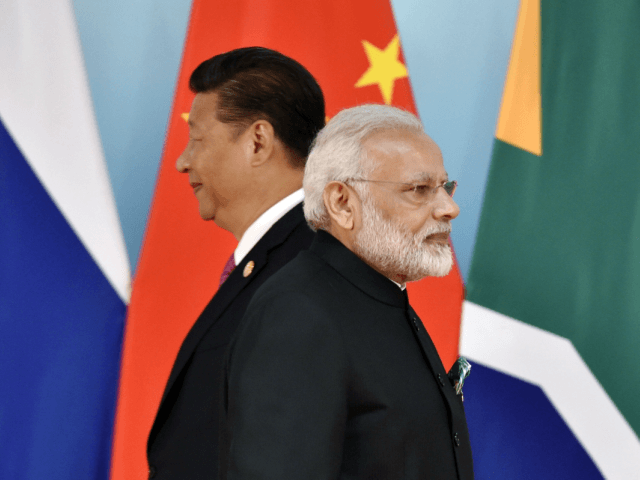Chinese delegates to the Shangri-La Dialogue in Shanghai this weekend scoffed at the notion India’s military could challenge the People’s Liberation Army (PLA) of China, while Chinese state media portrayed a deadly Indian train crash as evidence that Prime Minister Narendra Modi’s government is incompetent and untrustworthy.
Tensions between China and India have been running high ever since a deadly hand-to-hand battle on their contested Himalayan border in June 2020. Over the past month, the regional rivals have ejected almost all of each other’s journalists. Both sides have continued to develop and reinforce their positions along the border.
![This video frame grab taken from footage recorded in mid-June 2020 and released by China Central Television (CCTV) on February 20, 2021 shows Chinese (foreground) and Indian soldiers (R, background) during an incident where troops from both countries clashed in the Line of Actual Control (LAC) in the Galwan Valley, in the Karakoram Mountains in the Himalayas. (Photo by - / CCTV / AFP) / China OUT / RESTRICTED TO EDITORIAL USE - MANDATORY CREDIT "AFP PHOTO / CHINA CENTRAL TELEVISION (CCTV) " - NO MARKETING NO ADVERTISING CAMPAIGNS - DISTRIBUTED AS A SERVICE TO CLIENTS / The erroneous mention[s] appearing in the metadata of this photo by - has been modified in AFP systems in the following manner: [February 20, 2021] instead of [January 20, 2021]. Please immediately remove the erroneous mention[s] from all your online services and delete it (them) from your servers. If you have been authorized by AFP to distribute it (them) to third parties, please ensure that the same actions are carried out by them. Failure to promptly comply with these instructions will entail liability on your part for any continued or post notification usage. Therefore we thank you very much for all your attention and prompt action. We are sorry for the inconvenience this notification may cause and remain at your disposal for any further information you may require. (Photo by -/CCTV/AFP via Getty Images)](https://media.breitbart.com/media/2021/05/Report_-China-Rebuilding-Military-Presence-Along-Indian-Border-1024x768.jpg)
This video frame grab taken from footage recorded in mid-June 2020 and released by China Central Television (CCTV) on February 20, 2021, shows Chinese (foreground) and Indian soldiers (R, background) during an incident where troops from both countries clashed in the Line of Actual Control (LAC) in the Galwan Valley, in the Karakoram Mountains in the Himalayas. (AFP PHOTO / CHINA CENTRAL TELEVISION (CCTV) via Getty Images)
Delegates from the PLA confidently stated at this year’s forum that India, China’s regional rival and a major ally of the United States, is “unlikely to catch up to China in the coming decades because of its weak industrial infrastructure.”
“When you look at the Indian military’s weapon systems, what types of tanks, aircraft and warships were made and developed by Indians themselves?” asked PLA Senior Col. Zhal Xiaozhuo at the meeting, needling India for its heavy reliance on weapons from other countries, especially Russia and the United States.
Other Chinese military representatives insisted they have no plans for conflict with India, or to invade Taiwan, because China supposedly prefers the “Asian model” of negotiations instead of conflict. PLA Senior Col. Cao Yanzhong claimed China’s menacing buildup of military forces around Taiwan is merely a “deterrence strategy” to keep Taiwanese pro-independence activists from going too far and to keep other countries from helping Taiwan to secede.
On Monday, Indian Defense Minister Rajnath Singh met with U.S. Defense Secretary Lloyd Austin to plan a “five-year roadmap” for strengthening defense and industrial cooperation. The threat from China was a clear mutual interest.
“I’m returning to India to meet with key leaders for discussions about strengthening our Major Defense Partnership,” Austin said. “Together, we’re advancing a shared vision for a free and open Indo-Pacific.”
The Indian Defense Ministry said the meeting was intended to “identify opportunities for the co-development of new technologies and co-production of existing and new systems, and facilitate increased collaboration between defense startup ecosystems of the two countries.”
Indian Prime Minister Narendra Modi is scheduled to visit Washington on June 22, a trip during which the Times of India (TOI) speculated some major defense contracts might be announced, such as India purchasing some $2 billion worth of long-range American drones.
India is also reportedly interested in building jet fighter engines under a technology-sharing agreement with U.S. companies.
China’s state-run Global Times jumped in on Sunday with an editorial advising the Americans not to rely on Modi, because the horrific train collision in Odisha, India, on Friday that killed 275 people was evidence that Modi’s government is dangerously incompetent.
After expressing sympathy for the Indian people over the three-train collision and acknowledging India’s “significant growth” in global manufacturing markets, the Global Times said that while India’s recent improvements in infrastructure were “noteworthy and worth bragging about,” they were not in a league with what China can offer foreign corporations.
“It is astonishing that more than 70 years after the British colonial era, India’s railways have experienced such a tragic accident. It is difficult to comprehend how a railway system that was once regarded as the most advanced in the world could have ‘declined’ to its current state. Is this issue a result of human error, or is it a systemic problem?” the Chinese Communist newspaper asked.
After musing on what a tragedy it would be if India’s growing manufacture of bombs and rockets were to experience an accident on par with the Odisha train accident, the Global Times advised India to dump democracy and embrace Chinese-style authoritarianism as the only way to bring its infrastructure into the 21st Century.
“What India currently needs is not just applause and praise, nor the pursuit of catching up or surpassing other countries. India needs to keep its head above the strategic lull of the West and focus on improving the quality of its population through solid and practical measures,” the editorial concluded.

COMMENTS
Please let us know if you're having issues with commenting.